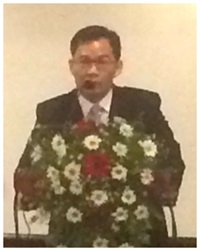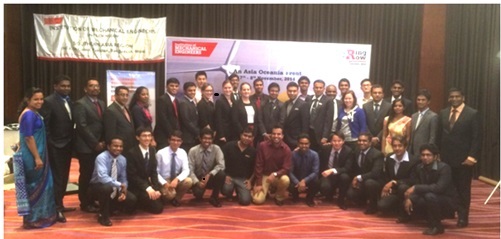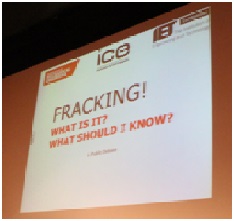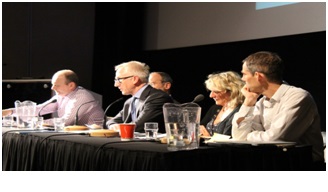A message from Ruth Shilston, Chair of the Young Members Board. In this edition of the Young Members Newsletter Ruth talks about a number of successful Young Member projects, including Engineering Tomorrow and the Global Engineering Debate.
Welcome to the final young member's newsletter for 2014. This newsletter is as packed as ever, however I want to take the opportunity to specifically highlight a number of major events which have been organised by young members.
The first is the Engineering Tomorrow event which I was fortunate enough to be invited to speak at and was held in Colombo, Sri Lanka at the beginning of November. This event was organised by our 2014 Young Member of the Year Siddartha Khastgir and brought together young members from across the Asia and Oceana regions. As well as the regional finals for Speak Out for Engineering, the event included learned society talks, a panel discussion and sessions looking at the value proposition for members outside of the UK. For me it was fascinating to meet people from a range of cultures and eye opening to see the challenges faced by engineers in locations less developed than the UK. Read more about the event in Institution News.
One item which this event highlighted was the lack of awareness of the institution prizes and awards. They are also not well know about in the UK and it is therefore something which we featured in our most recent Young Member's Board meeting. This served as a reminder to all that there is money available for activities that you want to undertake, you just need to apply for it. More information about the awards that the IMechE offers can be found on the Prizes and Awards webpage.
The other Young Member led activity that I want to highlight is the test event for our Global Engineering Debate which was hosted in Reading, and organised jointly with the IET Young Professionals. Delali Dei, who is leading this project from the IMechE, side has written up a full account of the event below and if you think that you could hold a debate in your region, then please do get in touch.
Finally, I want to say well done to the Wessex region for setting up their new panel. Gavin has written an account of their first panel meeting which I expect to be the first of a number of successful events in this region.
Best wishes and seasons greetings,
Ruth
Global Engineering Debate
After months of careful planning the Global Engineering Debate test event kicked off with a bang! See what the IMechE YM's and IET Young Engineering Professionals have been up to below.

The very first Global Engineering Debate event, organised jointly by the IMechE young members and IET Young Professionals took place in Reading, UK on 27th November 2014. It was a great success and the organising committee would like to express our sincere thanks to everyone who played a part in making it happen.
The speakers; Sam Lisney, Mechanical Graduate Engineer at Petrofac, Florian Bay, Nuclear Graduate and Energy Analyst at EDF Energy and Charles Briggs, Assistant Project Manager at Technip Offshore spoke with such eloquence and intelligence, which the audience thoroughly enjoyed.
The debate Chairperson, Dr Colin Brown, Director of Engineering at the IMechE with his vast experience in engineering and in chairing debates did a great job at guiding what was a lively, yet amicable discussion between young engineers. He was great at stimulating the discussion with questions from twitter and directly from the audience, touching on key subjects such as cost, efficiency and security of supply.
Prior to this event, the organising committee was not aware of another event which has been organised remotely by a team of volunteers via conference calls and emails, with very few face to face meetings, albeit sometimes giving up entire weekends to run through actions.
Whilst the premise of the debate was not to have a winner, the votes were as follows:
Before the debate
Nuclear: 69% of the votes
Fossil: 0 of the votes
Renewables: 31% of the votes
After the debate:
Nuclear: 33% of the votes
Fossil: 11% of the votes
Renewables: 56% of the votes
Summary:
Nuclear: -36% swing
Fossil: 11% swing
Renewables: 25% swing
Well done to all the young engineers and staff who made this happen; watch this space for the Grand Launch which will take place in Spring 2015.
Home Automation Challenge – Apprentice Competition
Do you want to develop your engineering skills and win £2,000? Do you have an idea that could make life easier for everyone? This new competition is for teams of apprentices to design and manufacture a product to make a job in the home easier.
The Manufacturing Industries Division (MID) have launched a competition for teams of apprentices to design and manufacture a product to automate a task in the home.
There are no limitations on designs and the scope is as broad as the imagination of the participants. Teams must demonstrate engineering competence according to Engineering Council UK-SPEC for EngTech through carrying out the following:
● design a product and prototype a working model
● provide a design specification, manufacturing instructions and user manual
● provide a business case for the mass production and sale of the product.
The winning team will receive £2,000 prize money, a plaque and certificate. Teams will receive final details in January 2015 and finals will take place in June 2015.
Please register your interest to participate in the competition by 31 December 2014.
See the Home Automation Challenge webpage for more details.
Engineering Tomorrow: preparing the next generation
The Institution's Southern Asia Region successfully hosted a two-day event for young members based in Asia-Oceania called Engineering Tomorrow.
This November saw the Institution's Southern Asia Region host “Engineering Tomorrow”: an Asia-Oceania event for the young members of the constituting regions, which was combined with the Asia Pacific Speak out for Engineering (SOFE) finals held in Colombo, Sri Lanka. The participating nations were China, Hong Kong, Thailand, Malaysia, Singapore, Australia, New Zealand, Pakistan, India, UK and Sri Lanka.
The event was supported by the Young Members Board and also included an Annual Dinner, Young Member Conference and Learned Society talks.
The Engineering Tomorrow experience started with a visit to the University of Moratuwa. Sam Perera, Lasantha Kurukularachchi and Siddartha Khastgir (Young Member Visionary Award winner) were in attendance as Monujesh Borooah spoke to students of Mechanical Engineering on the IMechE and the benefits of membership.
The presentation was followed by an extended discussion wherein Siddhartha detailed the competitions, prizes and awards that can be won.
Speak Out for Engineering Competition
The Speak Out For Engineering (SoFE) preliminaries started in the afternoon of 6th November 2014. The contenders were from Southern Asia and the Sri Lankan representative went forward into the finals.

Annual Dinner
The IMechE Sri Lanka Group's Annual Dinner featured as part of the Engineering Tomorrow event and included a traditional inaugural lamp lighting by all dignitaries, as well as traditional dancing.
Learned Society Talks
International speakers sharing their insights on engineering, exposing our young members in Sri Lanka with the realms of possibilities that engineering has to offer.
Professor Alan Kin-Tak Lau spoke on New Challenges for IMechE towards Aviation Industry.
The challenges are in the three segments of manufacturer/supplier, airline industry and airport industry.Sustainability and recyclability are the way forward and 9% of structural weight in an AirbusA380 is in composites versus only 3% in a Boeing.
AirbusA380 is in composites versus only 3% in a Boeing.
Mr. Ken Tushingham spoke on how being an engineer is a 24-hour thing: its a way of life. Its very individual and personal and may lead you to do extraordinary things. All you need is an enquiring mind, an imagination and a trigger!
Mr. Gemunu Silva spoke on Ancient Technology in Sri Lanka. He showed that use of tools started in 125,000BC and that geometric microliths have been uncovered from 28,500BC and that the remains of a large city dating to 9,000BC has been discovered in Anuradhapura.
Mr. T. S. Sangha spoke on Accreditation, Assessment and Routes to Membership. He elaborated on UK SPEC, the three levels of professional registration and academic assessments.
He also detailed the accreditation of higher education programmes and the process that needs to be followed.
Dr. Helen Meese communicated with the audience through video on Engineering in Society: Preparing Our Next Generation. She spoke on fundamental concepts, basic integrals, engineering innovation and policy statements issued by the IMechE. Her final message was, “The public responds well to technology that is given social relevance. The science and engineering communities need to pay greater attention to the globally shifting needs of society.”
In the panel discussion moderated by Siddhartha Khastgir, Mr. Rankin spoke on the need for diversity – how he relies on his Sri Lankan staff to take decisions. He elaborated further on the diversity of emerging economics and the competition thereof and that, finally, different countries need different solutions and engineers are needed for these solutions.
Mr. T. S. Sangha brought out the fact that 50 years ago, most IMechE members were engineers in the field. Very few were academics. Today, we seem to be losing the practical touch in many ways.
Mrs. Ruth Shilston highlighted the incredible opportunity to maximise growth in digital communication – ‘I can do my job from anywhere in the world’. She also stressed the interdisciplinary factor – that mechanical engineers now lead design of buildings, that she is a part of a multidisciplinary team and that the lines are getting blurred.
Mr. Newton Wikramasuriya began with the question: ‘Are we taking the path of outcome based engineering or hands-on engineering?’ He talked about the low awareness of whether an engineer, once qualified, needs to be professionally registered. He called for a rationalised approach to engineering.
Mr. Wikramasuriya brought out the cultural factor: that due to prevalent system of education and society, bright students are pushed into engineering without aptitude tests.
Young Member Conference
The engineering community and thinkers around the world has acknowledged the fact that the society will be taken forward by our young engineers, thinkers and entrepreneurs. It is paramount responsibility of the established and experienced engineers to guide the young generation towards releasing their potential and engage them more proactively.
The young member conference encouraged student members of IMechE from Sri Lanka and young members for the Asia Oceania region to have an interaction and to share their expectations about what the IMechE should offer. The conference focused on creating a pilot scheme to increase young member activities internationally. The basic aim of the young member conference was to encourage students to pursue an engineering career and improve the world through engineering.

Fracking Debate
Fracking! It's a term that provokes emotion. It is receiving a huge amount of media attention and was even included in the Queen's speech; but what is it? What is all the fuss about?
In layman's terms Fracking is the use of high pressure water to fracture rock deep underground to release gas and oil reserves. Its rapid use in America has caused a massive change to the market there reducing prices and reducing America’s dependence on imports. However, in the UK we don't yet know how much fuel is potentially recoverable. Also the process has been claimed to trigger earthquakes, pollute ground water and create large amounts of pollution.
release gas and oil reserves. Its rapid use in America has caused a massive change to the market there reducing prices and reducing America’s dependence on imports. However, in the UK we don't yet know how much fuel is potentially recoverable. Also the process has been claimed to trigger earthquakes, pollute ground water and create large amounts of pollution.
In Yorkshire we held a debate last month on this very subject with the primary aim to provide a panel of experts to look at Fracking critically based on research and evidence and highlight the really key factors that need to be considered before a decision can be made on whether it goes ahead or not.
It was definitely lively and drew a good audience of engineers; primarily from the IMechE, ICE & IET as well as the general public.
The panellists included;
- David Hirst of Ainsty Risk Consulting Ltd as the chairman
- Professor Jim Watson of the UK Energy Research Centre
- Ms Jane Thomas from the Friends of the Earth
- Mr Andrew Sloan from Dart Energy (Europe) Ltd
- Mr Paul Blomfield MP (Sheffield Central)

In terms of panel dynamic Jim Watson and Paul Blomfield spoke of the more general wider energy issue and how Fracking may/or may not have a part to play. Jane Thomas was in the against camp while Andrew Sloan was for Fracking. Although there were some disagreements it was a well rounded panel.
As expected, with such a controversial topic we were, on some occasions, led down a non-evidence based subjective discussion on "how do you sleep at night?"-esque questions which, although they capture the audience's attention, they are not constructive to a good debate and puts panellists on the back foot in defence. With that in mind I think our chair David Hirst did a great job of fielding questions in an attempt to get the most out of the panel and disseminate as much information as possible.
Personally the message I took from the debate is that there are still a lot of questions to be answered in UK relating to how much shale exists and whether extracting it is economically viable. But in order to work this out exploratory drilling is needed. In addition as with every industry there are hazards to be dealt with and through robust engineering the risk of these hazards being realised can be reduced as low as possible.
A valid point that stuck with me is during arguments of burning the methane and how this does not help in our efforts to combat climate change Andy Sloan from Dart Energy rebuked "I agree, it is a travesty that after drilling the well and extracting the gas it gets burnt. There are so many other uses for Methane other than just burning it!" And if you think about he is right there, unfortunately realistically the primary purpose of Fracking for methane will more than likely be to burn it.
Based on what I heard at the debate I don't see Fracking as a long term solution for the UK energy demand in years to come however with our aging infrastructure of power plants we may well need a "bridging fuel" in order to get our house in order. Fracking certainly has a part to play in that, the risk just needs to be well managed and the industry must be transparent in order to put the public's fears to rest.
demand in years to come however with our aging infrastructure of power plants we may well need a "bridging fuel" in order to get our house in order. Fracking certainly has a part to play in that, the risk just needs to be well managed and the industry must be transparent in order to put the public's fears to rest.
In a snap poll at the end of the evening only one audience member, out of approximately 150 attendees, was willing say that the debate had changed their mind on the subject. However, I think everyone who attended the event, myself included, would admit that they had learnt something. The debate will roll on.
Careers and Beers
Careers + beer = a successful Young Member event. Read more below.
Completing an engineering course is tough; you are dealing with the constant battle to get out of bed, a long schedule of social activities and on top of all that studying for the degree. You would think that finally getting a job will solve all your problems… but how do you make the transition from being a student to a professional engineer?
Scottish Young Members have designed an event that helps to make the change in the least painful way… over a drink (or two). Once a year, when students start to look around on the jobs market, they can come to a local venue and speak to recently employed graduates from a portfolio of companies. Similar to “speed dating” it allows them to find out what a variety of local employers have on offer and ask any questions they may have. The event is extremely popular with students (with refreshments provided) and gives employers an opportunity to engage with prospective employees in an informal way.
The event has so far taken place in Aberdeen, Edinburgh and Glasgow, giving hundreds of young students and graduate engineers the chance to network and share experiences. See the YouTube link for footage of last year’s event in the Glasgow area:

New Wessex Region Panel
Our story - Journey of setting up Wessex Young Member Panel
The idea of setting up a new Young Member (YM) panel was formed a year ago during the Wessex regional meeting. The regional board had a vision of bringing in ‘new blood’ with an enthusiastic attitude on engineering into the IMechE community. Back then, we only had one Young Member on the Portsmouth and Isle of Wright area committee and another on the Bournemouth committee.
Following the MP engagement event in October 2014, a few YM’s from Portsmouth and Bournemouth met for a drink and discussed the possibility of setting up our Regional YM Panel. Conversation heated up very quickly and exciting ideas were flying. A few days later we were all into action and our Facebook page was set up. Soon afterwards, our first YM meeting was held in November over beer and many slices of pizza in Portsmouth University. On the same night our Panel was formed and included a mixture of undergraduates, recent graduates and experienced young engineers.
Our members came up with many creative events for next year, as well as some fun STEM activities we could do with school children to promote engineering as a potential career option.
We will be holding a Committee meeting in January 2015, where we are looking forward to attracting more young engineers into our newly formed Panel. We might even have the world record youngest YM if our Chairman Simon Porter's new born son arrives on time for Christmas day!